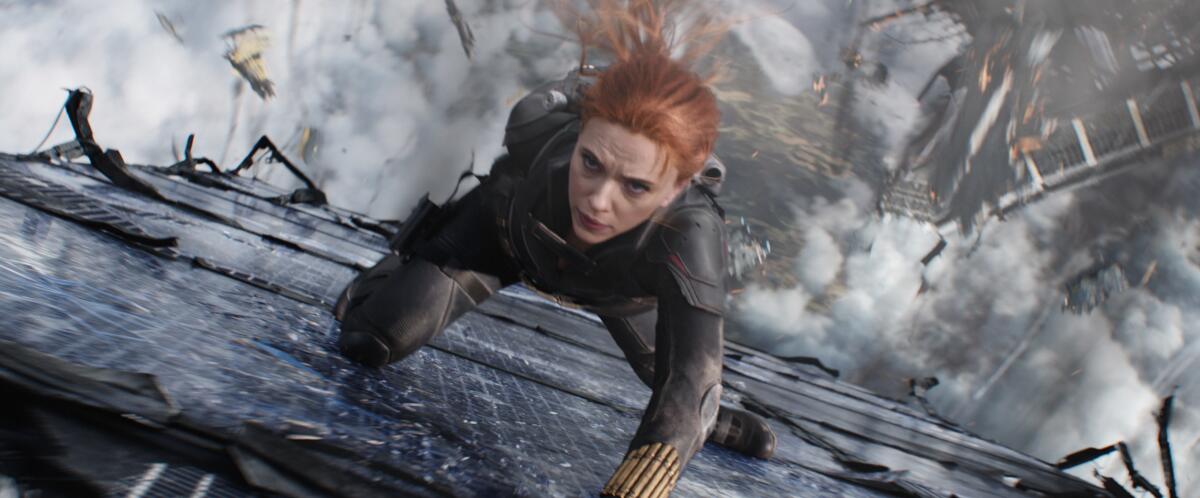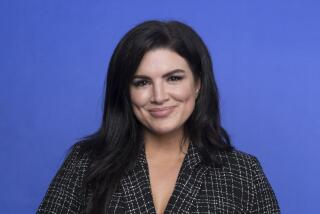Scarlett Johansson and Disney settle ‘Black Widow’ contract dispute

- Share via
Scarlett Johansson and Walt Disney Co. have settled their high-profile dispute over the release of Marvel’s “Black Widow.”
Terms were not disclosed.
Johansson, who played the Black Widow character in multiple Marvel Studios movies, sued Disney in July for allegedly causing Marvel to breach its contract with her.
Inside the business of entertainment
The Wide Shot brings you news, analysis and insights on everything from streaming wars to production — and what it all means for the future.
You may occasionally receive promotional content from the Los Angeles Times.
Her lawsuit argued that Disney has cheated her out of box office bonuses from the movie by releasing it on Disney+ for a $30 charge at the same time as its theatrical debut, cannibalizing ticket sales and resulting in rampant piracy.
Johansson’s camp reportedly believed the hybrid release left roughly $50 million in bonuses on the table. Disney had denied her claims as meritless.
“I am happy to have resolved our differences with Disney,” Johansson said in a statement. “I’m incredibly proud of the work we’ve done together over the years and have greatly enjoyed my creative relationship with the team. I look forward to continuing our collaboration in years to come.”
Scarlett Johansson and Walt Disney Co. are locked in a legal fight and war of words over “Black Widow’s” online release. It’s the latest flashpoint where talent pay practices have yet to catch up to broader industry changes.
The lawsuit drew attention to long-simmering debates within Hollywood over how talent, including directors and A-list stars, should be compensated for their work when it’s released on streaming services. The biggest stars often get box office bonuses or profit participation to reward success, also known as “back end” pay. Streaming services usually buy out their stars’ typical back end upfront.
During the pandemic, many studios chose to release films online and in theaters simultaneously, throwing a wrench in the typical business model. Warner Bros. paid out more than $200 million to artists after parent company WarnerMedia decided to put all its movies on HBO Max at the same time as their theatrical rollout.
Johansson’s beef with Disney was unusual because of how public it was. Most contract disputes are resolved through negotiation or arbitration, not through litigation.
But the lawsuit sparked a war of words between Disney and Johansson’s representatives, with even her agent, CAA’s Bryan Lourd, stepping into the public fray.
Some observers predicted that Johansson’s salvo would result in a wave of similar lawsuits from Hollywood talent. So far, that has not happened. Emma Stone, whose “Cruella” was also released same-day on Disney+’s $30 purchase offering, recently secured a deal for a sequel to the villain origin story.
While Johansson’s character was killed off in “Avengers: Endgame,” the actress still has a project with Disney: a movie based on the company’s “Tower of Terror” theme park ride.
“I’m very pleased that we have been able to come to a mutual agreement with Scarlett Johansson regarding ‘Black Widow,’ ” Alan Bergman, chairman of Disney Studios Content, said in a statement. “We appreciate her contributions to the Marvel Cinematic Universe and look forward to working together on a number of upcoming projects, including Disney’s ‘Tower of Terror.’ ”
More to Read
Inside the business of entertainment
The Wide Shot brings you news, analysis and insights on everything from streaming wars to production — and what it all means for the future.
You may occasionally receive promotional content from the Los Angeles Times.












